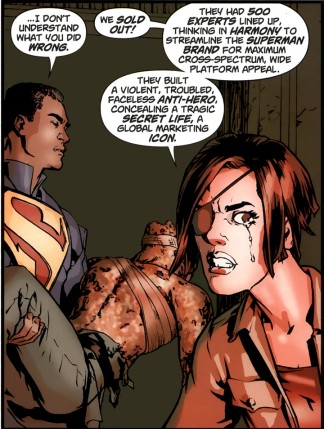
When I saw the Avengers movie yesterday, I thought there were two film's competing for the (hypothetical) audience's attention, and while I enjoyed one, I could've done without the other.
The first film is a thoughtful character piece which takes a look at the costs of military expansion and the theory of deterrence's validity. It's immediately established that Fury would never have unleashed Loki and his Chitau'ri allies on Earth were he not fiddling with the Tesseract as a means to make weapons. He claims that he was looking at a source of clean energy, but as is so often the case with the military industrial complex, the beneficial uses of the new technology just end up as the agreeable wrapping paper trying to hide the jingoistic core. He assembles the Avengers to clean up the mess he effectively caused, and when they find out what he's really been up to, he justifies it by blaming them for bringing superhuman menaces to Earth and claiming a need for self-defense.
Self-defense is perfectly valid, but it's hard to believe that Fury and SHIELD would just stop at deterrence. This is an organization wire-tapping every electronic device around the globe, confiscating/stockpiling the weapons of the worst criminals in history, and sending their highly skilled agents to capture or kill people at will. If anything, it confirms Loki's idea that people want to be ruled-- that they would rather feel safe with Big Brother watching over them, than know any true freedom. Which works up to the point when it doesn't, when you end up with neither due to an invasion.
The best review I've found of the Avengers is Something Awful's, which eloquently (if critically) expresses this problem. However, I disagree with the author's belief that the Avengers is a justification of the US brand of imperialism. If anything, it's advocating the ability of individuals over byzantine political systems. The Avengers are all unique, skilled, yet damaged individuals. They may have been collected by Fury, but when they form a team, they do so on their own terms. And after they defeat the enemies, they go their separate ways, but will still come together if needed for another crisis. The Avengers don't represent America or any other nation; they represent people who can and will save lives. The only will they follow is the will of Coulson, after he proved too good for our sinful planet.
The other film, on the other hand, is exactly what I feared the Avengers would be; a sensationalistic fangasm, a film that exists with no purpose beyond putting a bunch of big stars in the same room. For the most part, the Avengers avoids this due to mixing thoughtful and sympathetic character scenes with the big set pieces. However, we all know which one gets asses in seats. So unfortunately, the latter half of the movie is one long, repetitive fight. Which would be fine if it were shorter, but when you keep the action at that high level for so long, it stops being so intense. The Chitau'ri have no personality beyond being Mooks for the Avengers to slaughter (I assume they don't have families, right?), and their design doesn't even go beyond most CG aliens. When the Chitau'ri ship appeared, the big metal snake reminded me of Shockwave's craft in Transformers 3. Any time I'm comparing something to a Michael Bay movie, that's not a good sign, though at least this movie has substance beyond the prolonged final battle and at least keeps its goddamned camera steady.
My fear was that this would be the end of the super hero movie's unique qualities; once they get to the crossovers, they become the same recycled garbage that so often characterizes the comics. The superhero is no longer special, but a face in a crowd of hundreds of others, with the act of putting on a costume being just another profession in that universe (albeit one that looks ridiculous to most in our universe). The Avengers doesn't go that far, as it thankfully keeps to a smaller cast and features a well-written story on top of all the requisite explosions. Still, can the next Avengers movies keep that self-contained? Or will we inevitably see "Avengers V: Secret Infinity Siege " and " Avengers VI: Coulson Reborn"?
My general perspective with Marvel media (or any big franchise divorced from its original creators, for that matter) is to assume it's going to be bad and be surprised when it isn't. But with the Avengers, at least, I was surprised. Highly Recommended.





